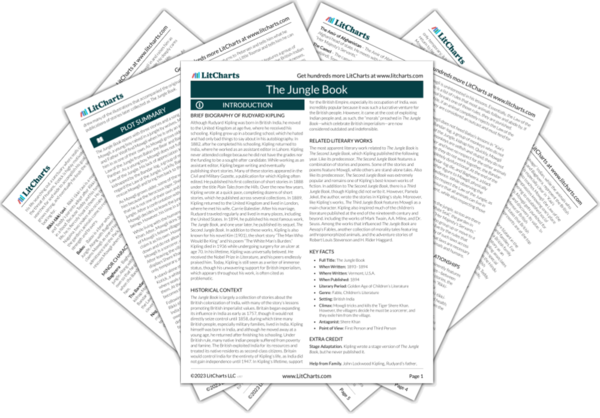Throughout The Jungle Book, Kipling’s stories reflect the importance of loyalty, especially among families. Family, in the book’s understanding of it, can be both biological and non-biological. For instance, in the Mowgli stories, Mowgli and his wolf brothers pledge their loyalty to one another even though they are not the same species. Similarly, in “Rikki-tikki-tavi,” after Teddy and his family take in Rikki-tikki-tavi, the eponymous mongoose, Rikki-tikki-tavi becomes loyal to him and his family. Rikki-tikki-tavi does everything he can to protect Teddy, including fighting off two cobras that try to kill him and his family. Mowgli has a similar relationship with his wolf siblings and wolf parents. Whenever an outside threat comes after Mowgli, his wolf family is always there to protect him. Similarly, Mowgli is always willingly to protect his wolf family. In general, The Jungle Book always rewards loyalty to others while punishing those who are disloyal or have no backbone. It depicts loyalty as a high virtue that everyone—whether human or animal—should strive for.
Meanwhile, those who are not loyal to their community get punished. For instance, the cobras in “Rikki-tikki-tavi” are only loyal to themselves. Their goal is to propagate their species, and they will deceive everyone around them to get what they want. Ultimately, their schemes fail, and they end up dead at the paws of Rikki-tikki-tavi.. In these stories, selfishness only leads to failure because one cannot thrive if one does not respect the people and animals around them. In the end, The Jungle Book shows how nature rewards people and animals who are loyal to their communities, allowing them to survive the perpetual dangers their surrounding environments throw their way. Meanwhile, those who prioritize their own welfare over the welfare of the collective community risk ostracization and death.
Loyalty ThemeTracker

Loyalty Quotes in The Jungle Book
‘And it is I, Raksha [The Demon], who answers. The man’s cub is mine, Lungri—mine to me! He shall not be killed. He shall live to run with the Pack and to hunt with the Pack; and in the end, look you, hunter of little naked cubs—frog-eater—fish-killer—he shall hunt thee! Now get hence, or by the Sambhur that I killed (I eat no starved cattle), back thou goest to thy mother, burned beast of the jungle, lamer than ever thou camest into the world! Go!’
‘I have taught thee all the Law of the Jungle for all the peoples of the jungle—except the Monkey-Folk who live in the trees. They have no law. They are outcasts. They have no speech of their own, but use the stolen words which they overhear when they listen, and peep, and wait up above in the branches. Their way is not our way. They are without leaders. They have no remembrance. They boast and chatter and pretend that they are a great people about to do great affairs in the jungle, but the falling of a nut turns their minds to laughter and all is forgotten. We of the jungle have no dealings with them. We do not drink where the monkeys drink; we do not go where the monkeys go; we do not hunt where they hunt; we do not die where they die.’
‘Lead us again, O Akela. Lead us again, O Man-cub, for we be sick of this lawlessness, and we would be the Free People once more[,]’ [cried the Pack.]
‘Nay,’ purred Bagheera, ‘that may not be. When ye are full-fed, the madness may come upon you again. Not for nothing are ye called the Free People. Ye fought for freedom, and it is yours. Eat it, O Wolves.’
‘Who is Nag?’ said he. ‘I am Nag. The great God Brahm put his mark upon all our people, when the first cobra spread his hood to keep the sun off Brahm as he slept. Look, and be afraid!’
Kala Nag, which means Black Snake, had served the Indian Government in every way that an elephant could serve it for forty-seven years, and as he was fully twenty years old when he was caught, that makes him nearly seventy—a ripe age for an elephant. He remembered pushing, with a big leather pad on his forehead, at a gun stuck in deep mud, and that was before the Afghan War of 1842, and he had not then come to his full strength.
‘But who gives them the order?”
‘Now you want to know too much, young un,’ said Billy, ‘and that is one way of getting kicked. All you have to do is to obey the man at your head and ask no questions.’
‘They obey, as the men do. Mule, horse, elephant, or bullock, he obeys his driver, and the driver his sergeant, and the sergeant his lieutenant, and the lieutenant his captain, and the captain his major, and the major his colonel, and the colonel his brigadier commanding three regiments, and the brigadier the general, who obeys the Viceroy, who is the servant of the Empress. Thus it is done.’
Children of the Camp are we,
Serving each in his degree;
Children of the yoke and goad,
Pack and harness, pad and load.
See our line across the plain,
Like a heel-rope bent again,
Reaching, writhing, rolling far,
Sweeping all away to war!
While the men that walk beside,
Dusty, silent, heavy-eyed,
Cannot tell why we or they
March and suffer day by day.











